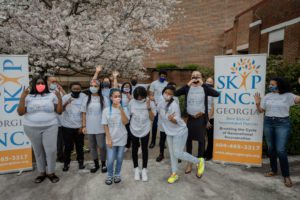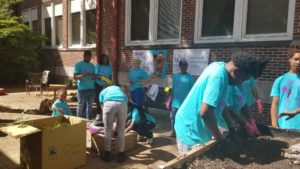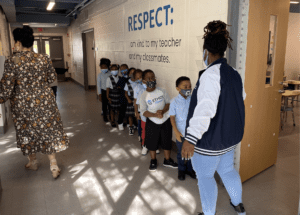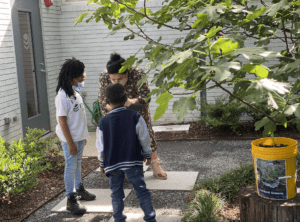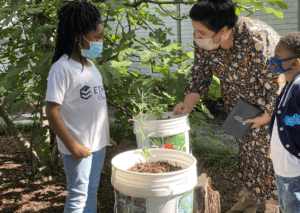June 13, 2019
No Comments
Brown v. Board–A Dream Denied?
“A dream deferred is a dream denied.” Langston Hughes
Last month marked 65 years since the Supreme Court issued its opinion in the landmark case Brown v. Board of Education (Brown v. Board) which declared that segregation of students in public schools on the basis of race was denying children equal protection under the law as guaranteed by the Fourteenth Amendment— and therefore unconstitutional. The anniversary of this landmark case prompted me to reflect on my own family’s educational experiences, my hopes and dreams for my children and my parents’ hopes and dreams for me. Have we fulfilled the hope and pledge embodied in Brown v. Board, or is it another one of America’s myriad of promises to people of color that are not only deferred but systematically denied?
The ruling of Brown v. Board was intended to forge a path to ensure all students have a right to equity in education. In the Court’s Opinion, Chief Justice Earl Warren noted education is “the most important function of state and local governments.” He continues: “in these days, it is doubtful that any child may reasonably be expected to succeed in life if he is denied the opportunity of an education. Such an opportunity, where the state has undertaken to provide it, is a right which must be made available to all on equal terms.”1 That was the promise of Brown v. Board in 1954; the promise to all Americans. As is all too often true in this country, particularly as it relates to people of color, this promise has yet to be fulfilled. What was purported to be a path to equity in education continues to lead to a dead end.
Like all too many African Americans and people of color in this country, I have countless, painful recollections of prejudice and experiences of racism during my lifetime, but my most vivid memory of discriminatory practices and education inequality involves my experience as a mother in the Atlanta Public Schools district (APS) in the mid-1990s. At the time that my daughter was entering the first grade, we lived in Southwest Atlanta. Our community and social circle were primarily African American, so we chose to enroll our daughter in the Minority-to-Majority (M-to-M) student transfer program in order to give her a more diverse educational experience. After waiting in line for hours, we were given the option to register our daughter at an elementary school in a predominantly white neighborhood. When I arrived at that school to finalize her registration, the school secretary seemed visibly shocked to find that I was African American. She then informed me that despite the documentation I presented, there were no more slots for first graders at the school.
I was consumed with anger ignited by the school secretary’s ignorance and the system-supported injustice. However, the most vivid memory I have of this incident was a visceral weight on my heart and soul of having to fight the same fight for equity that my parents and my parents’ parents had to fight. I quickly realized what was going on and sent letters and made phone calls to school board members. Though the school eventually agreed to admit my daughter, I was uncomfortable with how she might be treated and opted for her to attend a different school nearby instead.
Often, I think about the discrimination we experienced and how my education and income afforded me a level of privilege and access to address the injustice in a way that most other African Americans in my community cannot. However, at the root of our appalling experience was the underlying impetus for programs like M-to-M particularly the fact thatour educational systems have always been and continue to be fraught with inequity. Sixty-five years after Brown v. Board, and almost 160 years since our country’s segregated education systems were first created, there are still significant achievement gaps in APS between the average scores of African American and white students on state and national assessments— with white students outpacing others by as many as 50 points between average scores in certain grade levels and subjects. The weight of this systemic injustice continues to fall on the shoulders of African Americans, other people of color and those who are economically disadvantaged, and the necessity of this struggle for the opportunity to attend a quality school is a direct result of the school system’s failure to ensure equity and quality public schools for all families.
Sadly, my family’s experience in 1996 Atlanta mirrors the experiences and conversations parents are having in 2019 Atlanta, which are in turn identical to the conversations of the invincible parents and children who, in 1954, boldly stepped forth as plaintiffs in the cases that made up Brown v. Board. If we are to make the progress that is required to finally fulfill the promise made to American families so long ago, we must be bold and uncompromising in ensuring that every child receives an education equal to every other child in our city; irrespective of their zip code, the economic condition they were born into, their racial identity, their native language, natural abilities, or their ethnic lineage. We must end our legacy of failed promises. And if we are ever going to fulfill the pledge and dream of Brown v. Board anywhere, it should be in the Cradle of the Civil Rights Movement, Atlanta, in a school system that is led by people of color for a student population that is majority children of color. We must catalyze a movement of people who acknowledge the atrocities that they experience and that regrettably define our community and, who in turn, share responsibility for addressing these disparities in our lifetime.
Today there are countless families who experience similar situations to the one I faced over twenty years ago, and most will face these trials without the privilege and positional power that I have. This is not and should not be their problem, my problem, or solely a problem borne by African Americans and people of color: It is everyone’s problem. How we take care of our children is a direct reflection on who we are as a city. We all, those with and without privilege, must stand up and fight for change. African American communities, Latino communities, other communities of color and those in white communities need to stand up and walk shoulder to shoulder as allies in the fight for a high-quality public education for all students. Civic and business leaders also need to show up and speak out– to be truly engaged with our public education system; an essential part of their community. We all need to fight for what’s right and fight for that change to happen now– 65 years have passed and we’re faced with the same disparities and having the same conversations today that were had in 1954! We can’t afford to let another 65 years pass and have the same result. We must define and determine what quality public schools look like, raise up the practices and structures that are working best, and urgently change what is not working. Our children deserve to have their dreams fulfilled.
[1] Brown v. Board of Educ., 347 U.S. 483 (1954).
This piece was written by redefinED atlanta board member, Kim Anderson, on behalf of redefinED atlanta.
Kim Anderson has spent her career leading dialogue, advancing change and convening partners who are committed to empowering marginalized people. She was CEO of Families First, senior director for BoardWalk Consulting and executive director of AID Atlanta. A former attorney for Alston & Bird, Anderson was general counsel of Grady Health System, vice president and assistant general counsel for Magellan Health Systems and senior legal counsel for the Atlanta Housing Authority. Anderson serves on the boards of KIPP Metro Atlanta, Partners for Home and the Supreme Court of Georgia’s Committee on Justice for Children. Anderson holds a law degree from Columbia University and a bachelor of arts in psychology and sociology from Oberlin College.
